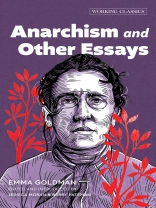A true classic of radical literature, in its first scholarly, annotated edition.
Emma Goldman, the “notorious anarchist” deported from the United States in 1919 for “seditious activities, ” was a leading figure of American anarchism for almost thirty years. She continued to write and speak on anarchism for the rest of her life in exile, first in Soviet Russia and then in Europe—including Spain during the Spanish Revolution—and, finally, Canada.
Goldman played a pivotal role in the development of anarchism in America and Europe in the first half of the twentieth century. This collection, first published in 1910 by her press, Mother Earth Publishing Association, illustrates her wide-reaching mind and ability to bring together strands of American and European individualism, anarchist communism, and early feminist thinking to develop a body of work that continues to influence the theory and practice of anarchism today. Essays include ‘Anarchism: What It Really Stands For, ‘ ‘The Psychology of Political Violence, ‘ ‘Prisons: A Social Crime and Failure, ‘ ‘The Hypocrisy of Puritanism, ‘ ‘The Tragedy of Woman’s Emancipation, ‘ and ‘Marriage and Love, ‘ among others.
A new introduction by Moran and Pateman situates Goldman’s thinking in the movement of her day but also makes clear why her essays are still vital. Annotations throughout bring to light individuals and events that enrich our understanding of Goldman’s writings.
The Working Classics Series revives lineages of radical thought from the history of the anarchist movement.
Over de auteur
Hippolyte Havel (1871–1950) was a Czech anarchist at the center of New York’s political and artistic circles at the turn of the twentieth century. He was an editor of numerous publications, including Emma Goldman’s Mother Earth and his influence on several writers, artists, and intellectuals helped shape American modernism.












